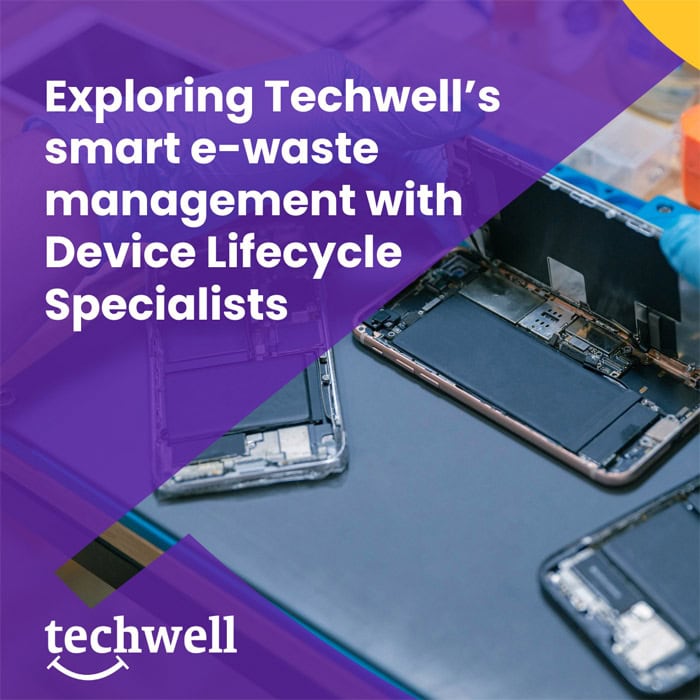Why sustainable device lifecycle management is the first step in smart e-waste management

We live in a world where technology is at the heart of everything we do, from firing off a quick email to orchestrating entire virtual conferences. This makes devices such as smartphones and laptops essential, but they don’t last forever. As these devices reach the end of their useful life, they contribute to a growing volume of electronic waste (e-waste). Each year, millions of tonnes of outdated or broken electronic devices end up in landfills, releasing hazardous substances into the environment and posing serious health risks.
Australia only manages to recover about one-third of the total value from the e-waste materials it generates. This inefficiency leads to approximately $430 million worth of materials from e-waste being sent to landfills each year. Effectively managing this e-waste is not only crucial for environmental sustainability but also for fulfilling corporate responsibilities. This highlights the essential role of device lifecycle management in processing e-waste more efficiently and maximising value recovery.
Techwell’s commitment to a greener future
At Techwell, we are deeply committed to reducing the environmental impact of e-waste. With a keen understanding of the pressing issue of e-waste, Techwell ensures responsible device handling throughout their lifecycle, minimising their environmental impact and contributing to a healthier ecosystem.
The role of the device lifecycle specialist
Device lifecycle management ensures that, from procurement to disposal, each stage in a device’s life is handled efficiently and sustainably. The role of a device lifecycle specialist is pivotal in this process. They oversee the entire lifecycle of devices, ensuring that each phase, from deployment to decommissioning, minimises environmental impact and maximises device utility. The device lifecycle specialist guarantees efficient device management tailored to the needs of individual end-users and service desks by streamlining MDM enrolment, facilitating reliable repairs, and ensuring ethical recycling practices.
Their work involves precise management strategies such as:
- Streamlining mobile device management (MDM) enrolment: the device lifecycle specialist will handle the technical aspects of MDM enrolment to ensure smooth deployment. They’ll ensure devices are correctly configured from the beginning, which reduces potential issues and integrates devices with existing systems seamlessly.
- Coordinating reliable repairs: the specialist will partner with trusted service providers to facilitate prompt and effective maintenance. This strategy keeps devices in optimal condition, extends their usability, reduces downtime, and enhances user satisfaction.
- Managing ethical recycling: at the end of a device’s lifecycle, the specialist collaborates with recycling firms that practice environmentally responsible disposal. This approach ensures that device disposal minimises environmental impact, aligns with sustainability goals, and meets ecological compliance standards.
- Ensuring transparent communication: the device lifecycle specialist will maintain clear and insightful communication channels to empower stakeholders. They let stakeholders make informed decisions regarding their technology resources and strategic directions by providing regular updates and comprehensive information.
Why do larger enterprises need a device lifecycle specialist?
Larger enterprises need a device lifecycle specialist for several critical reasons, each aligning with the complex needs and broad scale of their operations:
1. Complexity and volume of devices
Larger enterprises typically have a vast array of devices across multiple departments, locations, and possibly even countries. Managing each device’s lifecycle—from procurement and maintenance to decommissioning and recycling—requires specialised knowledge and coordination. A device lifecycle specialist can manage these complexities efficiently, ensuring that no device falls through the cracks.
2. Security and compliance
As enterprises are often subject to stringent security requirements and regulatory compliance standards, every device must be configured, updated, and decommissioned securely. A device lifecycle specialist ensures that all devices comply with the latest security protocols and data protection laws, reducing the risk of data breaches and non-compliance penalties.
3. Cost efficiency
Managing device lifecycles efficiently can lead to significant cost savings. Specialists help optimise the timing of device upgrades and replacements, manage warranties and service contracts, and maintain devices properly to extend their useful life. This can reduce the devices’ total cost of ownership significantly.
4. Sustainability
Increasingly, enterprises are expected to demonstrate corporate responsibility in their operations, including minimising their environmental impact. Device lifecycle specialists can guide ethical device recycling and disposal, helping companies meet their sustainability goals and reduce electronic waste.
5. Strategic resource allocation
A device lifecycle specialist can free up IT staff from the day-to-day management of devices, letting them focus on more strategic projects that can drive business growth and innovation. This can be crucial for large enterprises looking to maintain a competitive edge.
6. Customised support and scalability
Device lifecycle specialists tailor their approach to fit the business’s specific needs, whether scaling up operations, integrating new technology, or transitioning to different operational models. This customised support is particularly important for large enterprises that might need to adapt to market changes or technological advancements rapidly.
Get in touch today to learn how our team of device lifecycle specialists can support your enterprise’s responsible device lifecycle management.
